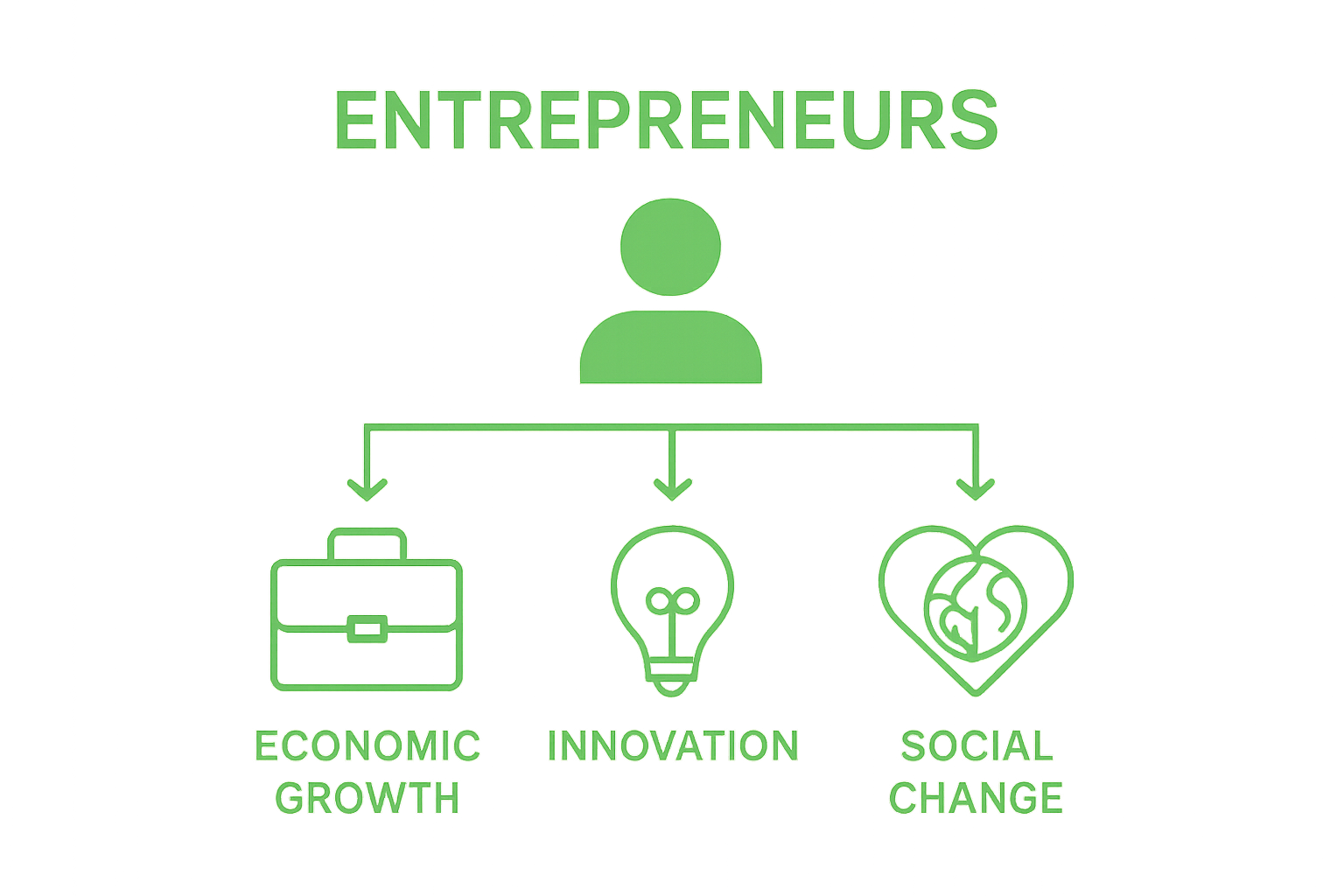
Understanding What is Entrepreneurship: A Complete Guide
Entrepreneurship often gets painted as a fast track to profit and independence, but its true influence stretches much further. Most people do not realize that small and medium-sized businesses launched by entrepreneurs make up roughly 90 percent of companies worldwide and provide nearly 70 percent of all jobs. Surprised? Those numbers only scratch the surface. Entrepreneurship is not just about making money or running a company. It is the engine behind new ideas, economic growth, and real social change.
Table of Contents
- Defining Entrepreneurship: What It Is And Its Purpose
- The Fundamental Nature Of Entrepreneurship
- Purpose And Impact Of Entrepreneurship
- The Importance Of Entrepreneurship In Today’s Economy
- Economic Transformation And Job Creation
- Driving Technological And Social Innovation
- Key Concepts Of Entrepreneurship: Ideas, Innovation, And Value
- The Genesis Of Entrepreneurial Ideas
- Innovation As A Transformative Process
- Creating Sustainable Value
- The Entrepreneurial Mindset: Skills And Traits For Success
- Core Psychological Characteristics
- Critical Skills For Entrepreneurial Success
- Cultivating An Entrepreneurial Perspective
- Navigating Challenges: Common Pitfalls And How To Overcome Them
- Financial And Resource Management Challenges
- Strategic Decision Making And Operational Challenges
- Psychological And Personal Development Challenges
Quick Summary
Defining Entrepreneurship: What It Is and Its Purpose
Entrepreneurship represents a dynamic process of transforming innovative ideas into tangible business opportunities that generate economic and social value. At its core, entrepreneurship goes beyond simply starting a business—it’s about identifying unmet market needs, developing creative solutions, and taking calculated risks to bring those solutions to life.
The Fundamental Nature of Entrepreneurship
According to the Organisation for Economic Co-operation and Development, entrepreneurship is a complex ecosystem of vision, change, and creation. Entrepreneurs are not just business owners but catalysts of economic transformation who possess several distinctive characteristics:
- Vision and Creativity: Ability to see opportunities where others see challenges
- Risk Tolerance: Willingness to invest time and resources into uncertain ventures
- Innovative Thinking: Developing unique approaches to solving problems
These individuals drive progress by introducing new products, services, and business models that challenge existing market paradigms. Learn more about how purpose can drive your entrepreneurial journey.
Purpose and Impact of Entrepreneurship
The purpose of entrepreneurship extends far beyond personal financial gain. It serves critical societal functions by:

- Economic Growth: Creating jobs and generating economic activity
- Innovation: Introducing breakthrough technologies and solutions
- Social Change: Addressing community challenges through business strategies
Entrepreneurs fundamentally reshape economic landscapes by translating abstract ideas into practical, scalable solutions that create value for customers, employees, and broader communities. Their work represents more than a career path—it’s a powerful mechanism for driving meaningful societal progress and solving complex global challenges.
The Importance of Entrepreneurship in Today’s Economy
Entrepreneurship serves as a critical engine driving economic transformation, innovation, and societal progress in the contemporary global landscape. It represents far more than a career path—it’s a powerful mechanism for addressing complex economic challenges and generating sustainable growth.
Economic Transformation and Job Creation
According to research examining global economic trends, entrepreneurs play a pivotal role in economic development by introducing innovative technologies and challenging existing market structures. Small and medium enterprises, predominantly driven by entrepreneurial initiatives, account for approximately 90% of global businesses and generate nearly 70% of worldwide jobs.
Key economic contributions of entrepreneurship include:
- Job Generation: Creating employment opportunities across various sectors
- Market Innovation: Introducing breakthrough products and services
- Economic Resilience: Developing adaptive business models that respond to changing market conditions
Explore strategies for solving business challenges as a new entrepreneur.
Driving Technological and Social Innovation
Entrepreneurs are not just economic actors but social change agents who address critical challenges through innovative solutions. They develop technologies and business models that solve real-world problems, from sustainable energy solutions to healthcare accessibility.
Their impact extends beyond immediate economic metrics, contributing to:
- Technological Advancement: Pushing boundaries of what’s possible in various industries
- Social Progress: Creating solutions that improve quality of life
- Community Development: Generating local economic opportunities
By continuously challenging existing paradigms, entrepreneurs ensure economic systems remain dynamic, responsive, and capable of addressing emerging global challenges.
Key Concepts of Entrepreneurship: Ideas, Innovation, and Value
Entrepreneurship is fundamentally a process of transforming creative ideas into valuable solutions that address market needs. It requires a deep understanding of three interconnected core concepts: generating innovative ideas, understanding market potential, and creating sustainable value.
The Genesis of Entrepreneurial Ideas
According to research from the National Academies Press, entrepreneurial ideas emerge from a combination of observation, creativity, and problem solving. These ideas are not random occurrences but strategic insights that arise from:
- Identifying Market Gaps: Recognizing unmet customer needs
- Personal Experience: Drawing insights from professional or personal challenges
- Technological Trends: Understanding emerging technological capabilities
Learn proven strategies for finding compelling business ideas.
Innovation as a Transformative Process
Innovation represents the critical bridge between conceptual ideas and practical business solutions. It involves reimagining existing processes, developing novel products, or creating unique business models that challenge traditional approaches. Successful innovation requires:
- Creative Problem Solving: Developing unique approaches to addressing challenges
- Adaptability: Willingness to pivot and refine ideas based on market feedback
- Continuous Learning: Staying updated with industry trends and technological advancements
Creating Sustainable Value
Ultimately, entrepreneurship is about generating meaningful value for customers, stakeholders, and society. This value extends beyond financial metrics to include social impact, technological advancement, and solving complex problems. Value creation involves:
- Customer Satisfaction: Developing solutions that genuinely improve users’ lives
- Economic Impact: Contributing to job creation and economic growth
- Social Innovation: Addressing broader societal challenges through business solutions
By understanding and integrating these key concepts, entrepreneurs can transform abstract ideas into impactful, sustainable business ventures that drive meaningful change.
The Entrepreneurial Mindset: Skills and Traits for Success
The entrepreneurial mindset transcends traditional business thinking, representing a unique psychological approach that enables individuals to transform challenges into opportunities. It is a complex combination of cognitive skills, emotional intelligence, and strategic perspectives that distinguish successful entrepreneurs from conventional business professionals.
The table below summarizes the key psychological characteristics and critical skills that define the entrepreneurial mindset, helping clarify what sets successful entrepreneurs apart from traditional business professionals.
Core Psychological Characteristics
According to research from MIT Sloan, the entrepreneurial mindset is characterized by three fundamental psychological traits: solutions orientation, adaptability, and resilience. These traits enable entrepreneurs to navigate uncertainty and convert potential obstacles into strategic advantages.
Key psychological characteristics include:
- Solutions Orientation: Proactively seeking resolutions instead of dwelling on problems
- Cognitive Flexibility: Rapidly adjusting strategies based on emerging information
- Emotional Neutrality: Maintaining composure during high-pressure situations
Discover essential habits for developing an entrepreneurial mindset.
Critical Skills for Entrepreneurial Success
Entrepreneurial success depends on a sophisticated skill set that goes beyond traditional business competencies. These skills involve continuous learning, strategic thinking, and the ability to synthesize complex information into actionable strategies.
Essential entrepreneurial skills encompass:
- Critical Thinking: Analyzing situations from multiple perspectives
- Strategic Planning: Developing comprehensive, forward-looking business approaches
- Networking Intelligence: Building and leveraging strategic relationships
Cultivating an Entrepreneurial Perspective
Transforming one’s mindset is a deliberate process of personal development and continuous growth. Successful entrepreneurs view challenges as opportunities for learning and innovation, maintaining an optimistic yet pragmatic approach to business challenges.
Key developmental strategies include:
- Continuous Learning: Consistently expanding knowledge and skills
- Experimental Mindset: Embracing calculated risks and learning from outcomes
- Persistent Self Reflection: Regularly evaluating personal performance and growth
By understanding and intentionally developing these psychological traits and skills, aspiring entrepreneurs can significantly enhance their potential for success in an increasingly complex business landscape.

Navigating Challenges: Common Pitfalls and How to Overcome Them
Entrepreneurship is a complex journey fraught with potential obstacles that can derail even the most promising ventures. Understanding these challenges and developing strategic approaches to navigate them is crucial for sustainable business success.
Financial and Resource Management Challenges
According to research from SCORE, financial constraints represent one of the most significant hurdles for new entrepreneurs. These challenges extend beyond simple cash flow issues to encompass broader resource allocation and strategic investment decisions.
Common financial pitfalls include:
- Undercapitalization: Insufficient funds to sustain initial business operations
- Poor Cash Flow Management: Inconsistent revenue tracking and expenditure planning
- Unrealistic Financial Projections: Overestimating potential revenue and underestimating expenses
Learn about the top reasons businesses fail and how to avoid them.
Strategic Decision Making and Operational Challenges
Successful entrepreneurs must develop sophisticated decision making skills that go beyond intuition. This involves creating robust systems for evaluating opportunities, managing risks, and maintaining operational flexibility.
Key strategic challenges entrepreneurs face include:
- Scaling Complexity: Managing growth without compromising core business quality
- Market Adaptation: Responding quickly to changing market dynamics
- Team Building: Recruiting and retaining talented individuals aligned with company vision
Psychological and Personal Development Challenges
Beyond external business challenges, entrepreneurs must manage significant internal psychological barriers. These challenges often determine long term resilience and success more than technical business skills.
Critical psychological challenges include:
- Imposter Syndrome: Self doubt and fear of inadequacy
- Burnout: Managing high stress and maintaining personal well being
- Decision Fatigue: Maintaining clarity and focus amid constant strategic choices
By anticipating these challenges and developing proactive strategies, entrepreneurs can transform potential obstacles into opportunities for growth and innovation.
This table provides an overview of common entrepreneurial challenges, grouped by category, and describes each to help readers anticipate and address potential pitfalls on their journey.
Turn Your Entrepreneurial Vision Into a Thriving Venture with siift
Building your own business can feel overwhelming. The article explored crucial challenges like validating your ideas, developing an innovative mindset, and avoiding common pitfalls such as financial missteps and burnout. These are real barriers that can stall even the most passionate founders on their entrepreneurship journey.
You do not have to figure it all out alone. Use siift to get personalized AI guidance designed specifically for entrepreneurs. Find clarity as you define your purpose, plan actionable steps, and receive feedback every step of the way. Ready to start transforming your ideas into a successful business? Join siift now and discover how simple it can be to take your next confident step.
Frequently Asked Questions
What is entrepreneurship?
Entrepreneurship is the process of transforming innovative ideas into viable business opportunities that generate economic and social value. It involves identifying market needs, developing creative solutions, and taking risks to implement those solutions.
What traits define successful entrepreneurs?
Successful entrepreneurs typically possess traits such as vision and creativity, risk tolerance, innovative thinking, solutions orientation, adaptability, and resilience. These characteristics enable them to navigate challenges and seize opportunities in the business landscape.
How does entrepreneurship contribute to economic growth?
Entrepreneurship drives economic growth by creating jobs, introducing innovative technologies, and generating economic activity through new products and services. It represents a key factor in developing resilient economies and enhancing market dynamics.
What are the common challenges faced by entrepreneurs?
Common challenges include financial and resource management issues, strategic decision-making hurdles, operational complexities, psychological barriers like impostor syndrome and burnout, and the need for continuous adaptation to changing market conditions.
Recommended

see where you really stand





.svg)
.svg.png)



.svg)

